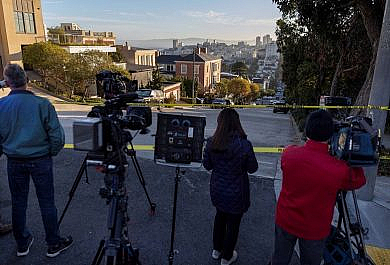Senator Dianne Feinstein, the California Democrat and former San Francisco mayor who broke barriers for women in politics throughout her five-decade career, died Thursday night in Washington DC at 90.
Summary
Senator Dianne Feinstein, the California Democrat and former San Francisco mayor who broke barriers for women in politics throughout her five-decade career, died Thursday night in Washington DC at 90.
- Her passing is a great loss for so many, from those who loved and cared for her to the people of California that she dedicated her life to serving,” said Feinstein chief of staff James Sauls in a statement. “There are few women who can be called senator, chairman, mayor, wife, mom and grandmother. Senator Feinstein was a force of nature who made an incredible impact on our country and her home state. She left a legacy that is undeniable and extraordinary.”
- Feinstein’s career was marked by a series of firsts. She went from being the first female president of the San Francisco Board of Supervisors to the first female mayor of San Francisco after the assassinations of Mayor George Moscone and Supervisor Harvey Milk in 1978.
- Her mayoralty won her national attention, including a spot on Democratic nominee Walter Mondale’s shortlist for vice president during the 1984 presidential election. Feinstein lost a close race for governor in 1990 but came back to win election as the first female senator from California in 1992.
- After her 1992 election, Feinstein would serve in the Senate for the next 31 years, winning reelection four more times, most recently in 2018. At the time of her death, she was the longest-serving female senator in US history and the longest-serving senator from California.
- Feinstein’s legacy includes authoring the 1994 assault weapons ban and her 2014 report on allegations of CIA torture in the early years of the War on Terror. From her perch on the Judiciary Committee, she played a role during the confirmation hearings of several Supreme Court justices.
- Her physical and mental decline became more pronounced in recent years and she was absent from the Senate for three months earlier this year after being diagnosed with shingles. Feinstein cast her final Senate vote on Thursday, just hours before she passed away at her home in Washington.
- California Gov. Gavin Newsom will appoint Feinstein’s successor. Newsom had previously pledged to appoint a black woman who would not seek a full term in 2024 to the seat. Democratic Reps. Katie Porter, Adam Schiff, and Barbara Lee are all running to succeed Feinstein in the 2024 Senate race.
![]()
- The New York Times observed “Ms. Feinstein’s political life first gained traction during a volatile period in San Francisco and played out in tense Senate years, when an impeached President Bill Clinton was acquitted and the nation went to war in Afghanistan and Iraq. Throughout, she was an eloquent champion of civil rights and gun control who defended and also denounced national security measures in the age of terrorism.
- Jerry Roberts wrote a piece for Politico reflecting on Feinstein’s work on behalf of the gay community. As James Haas, a gay advisor to Feinstein in the 1970s once put it, “Dianne Feinstein doesn’t care who you sleep with, as long as you’re in bed by 11 o’clock.” Feinstein “was among the nation’s first, tiny handful of officeholders to advocate for gay rights and anti-discrimination laws, a throughline of her career. As a personal matter, however, her square and straightlaced sensibilities — shaped by her Catholic school girl education, 1950s-era wife and motherhood, wealth and privilege — recurrently clashed with gay culture and aspirations in the public arena.”
- The Washington Post recalled the early years of her Senate career. “Mrs. Feinstein won her Senate seat in what became known as the Year of the Woman, an election that sent 24 new women to the House of Representatives and brought the total number of female senators to six.” The Post also noted that despite her reputation as a CIA critic for her torture report, she championed the intelligence community and frequently defended them. After the exposure of the NSA’s massive secret surveillance program in 2013, she backed the NSA, saying, ““It’s called protecting America.”
![]()
- The Wall Street Journal recalled Feinstein’s investigation into the CIA’s detention and interrogation program as the first female chair of the Senate Select Committee on Intelligence. “In 2014, the Intelligence Committee released the report’s executive summary, and Feinstein used a speech on the Senate floor to call the CIA’s actions a ‘stain on our values and on our history,’ delivering the remarks over the objections of President Barack Obama and officials in the CIA.”
- National Review noted Feinstein’s decline became more acute in recent weeks. “Earlier this month, Feinstein gave her daughter, Katherine, power of attorney over her legal affairs to focus on work in Congress amid a court battle involving her late husband’s estate property. And in July, the Democratic senator appeared confused during a Senate Appropriations Committee hearing’s roll-call vote. Instead of saying “aye” to notify the proceeding of her attendance, she started giving opening remarks before an aide interrupted her speech, leaving people questioning if she was still capable of finishing her term.”
- The New York Post Editorial Board called Feinstein’s passing “a sad day for American politics.” Feinstein won election in San Francisco “at a precociously young age in an era when high political opportunities for women were hugely limited. Coming into the mayor’s office on the heels of the 1978 assassination of George Moscone, she served for a decade and survived a recall effort. This in a city whose knifefight municipal politics can make Gotham’s look like a walk in the park.” Feinstein’s “endurance” would be a hallmark of her time in the Senate, where “she stayed in the game until the literal end.”
© Dominic Moore, 2023






